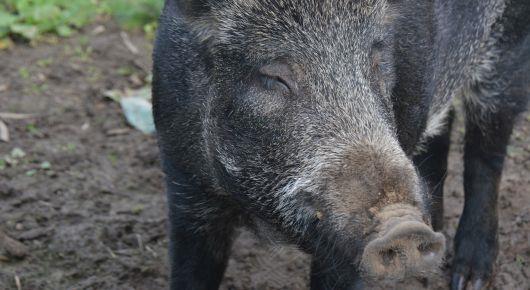Balkan countries take aim at African swine fever in wild boar

A pig disease originating from Southeast Africa, never before seen in Europe and Central Asia, hit the news in 2007 when it was first detected in Georgia. Since then, African swine fever has spread throughout Eastern Europe, entering the European Union in 2014.
Despite huge efforts and investments, no country has been able to control it effectively because of the absence of a vaccine and the difficulty of prevent its spread through wild boar and backyard pigs. Having been spotted recently in Bulgaria, Hungary and Romania, the disease is at the doorsteps of the Balkan region.
Everywhere it has emerged, African swine fever has caused the death of thousands of animals and spurred the implementation of trade restrictions. It has affected livelihoods and caused serious economic losses.
Control of the disease in wild boar is the focus of an international expert meeting starting today in Belgrade, organized by FAO with support from Czechia. Animal health specialists will exchange experiences and lessons learned while sharing practical solutions on African swine fever. They’ll discuss the various surveillance, prevention and control measures available for wild boar populations and how they could be practically applied in the Balkans.
Pig meat has nutritional value as an affordable source of protein, traditional in this region, and is an important source of income for smallholder families. Both diets and incomes are at stake due to this deadly virus. Wild boar also are susceptible to the disease and thus contribute to its persistence and spread. In fact, the animals probably constitute the biggest challenge for the control of African swine fever control in Europe.
“Correct biosecurity measures applied on farms are not enough to keep the disease at bay if, at the same time, there are no actions taken on their wild fellows,” said Daniel Beltran-Alcrudo, FAO animal health officer. “The implication of all partners related to wild boar in the discussions and development of strategies – such as hunters, forestry services and veterinary services – is crucial to coordinate an optimum management of the disease in wild boar populations.”
African swine fever is a virus infection, harmless to humans but lethal to pigs. It can survive in pork products for months, meaning that when herds are fed leftovers and kitchen waste, the disease can be reintroduced. Also, carcasses of wild boar will remain infected for a long time, allowing the disease to reemerge months after an outbreak is over.
At the meeting, countries with experience in the management of the disease, such as Czechia, Georgia, Lithuania, the Russian Federation and Ukraine, will share their experiences with Balkan countries. The meeting will bring together state veterinary specialists; representatives from forestry agencies, hunting associations and international agencies; and experts in wild boar biology and related fields.
The workshop will have both a theoretical part, with presentations and open discussions, and a practice-oriented part that focuses on sampling and biosecurity at a hunting ground.
The meeting will be followed by a national workshop to share recommendations with Serbia on its national control strategy to detect the disease’s spread early and to prevent and control African swine fever in wild boar. Similar workshops will follow in other Balkan countries in the coming months, including in Albania, Bosnia and Herzegovina, Kosovo*, Montenegro and North Macedonia.
FAO is further supporting the prevention and preparedness efforts of the Balkan region through a regional project. Over the next year, the project will assess countries’ gaps and more immediate needs and assist with the development of strategies. It also will provide training, help increase awareness to all partners (through the distribution of manuals and leaflets), assess preparedness through simulation exercises, and facilitate coordination across the region.
* References to Kosovo shall be understood to be in the context of Security Council resolution 1244 (1999).
21 May 2019, Belgrade, Serbia
